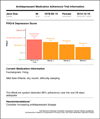MedLink: A Mobile Intervention to Address Failure Points in the Treatment of Depression in General Medicine
- PMID: 26640740
- PMCID: PMC4667803
- DOI: 10.4108/icst.pervasivehealth.2015.259042
MedLink: A Mobile Intervention to Address Failure Points in the Treatment of Depression in General Medicine
Abstract
Major depression is common, and imposes a high burden in terms of cost, morbidity, and suffering. Most people with depression are treated in general medicine using antidepressant medication. Outcomes are poor due to failure points across the care system, including patient non-adherence, failure of physicians to optimize the treatment regimens, and lack of patient-physician communication. This study reports on the 4-week pilot deployment of MedLink, a mobile intervention aimed at systemically addressing each of these failure points. A mobile app provides the patient with information and collects data on symptoms and side-effects. A cellularly enabled pill bottle monitors medication adherence. Data from these are provided to the physician and patient to foster communication and medication adjustments. Usability evaluation was generally favorable. Medication adherence rates in this first deployment were high with no patients discontinuing, and 84% of doses taken. Depressive symptom severity was significantly reduced. This study supports the use of a comprehensive, systemic approach to mHealth solutions to enhance processes of care for depression by general medicine physicians.
Keywords: adherence; mHealth; mental health.
Figures
References
-
- Kessler RC, Berglund P, Demler O, Jin R, Koretz D, Merikangas KR, et al. The Epidemiology of Major Depressive Disorder: Results From the National Comorbidity Survey Replication (NCS-R) Jama. 2003 Jun 18;289:3095–3105. - PubMed
-
- Wells KB, Stewart A, Hays RD, Burnam MA, Rogers W, Daniels M, et al. The functioning and well-being of depressed patients. Results from the Medical Outcomes Study. Jama. 1989 Aug 18;262:914–919. - PubMed
-
- Regier DA, Narrow WE, Rae DS, Manderscheid RW, Locke BZ, Goodwin FK. The de facto US mental and addictive disorders service system. Epidemiologic catchment area prospective 1-year prevalence rates of disorders and services. Arch Gen Psychiatry. 1993 Feb;50:85–94. - PubMed
-
- Olfson M, Marcus SC, Tedeschi M, Wan GJ. Continuity of antidepressant treatment for adults with depression in the United States. Am J Psychiatry. 2006 Jan;163:101–108. - PubMed
Grants and funding
LinkOut - more resources
Full Text Sources



